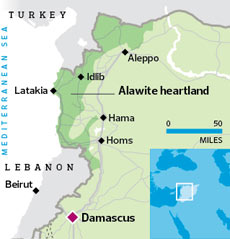By Azmi Bishara
Uruknet.info
(Edited translation from the Azmi Bishara Arabic facebook page; The Arabic original was posted earlier)
"1) In the end, there was
foreign intervention—but in Mali, and against the
Islamists, and not in Syria, where the regime accuses the Islamists of being
American stooges.
2) A point which gave some observers pause for thought:
those who opposed foreign military intervention in Libya against Qaddafi kept
quiet about military intervention in Mali, some of those even supported it. I
would say this is nothing out of the ordinary, since
attitudes to foreign
intervention were never based on principle, but rather have always been based on
interests. This applies to US intervention in the Korean peninsula and Viet Nam;
to Russian intervention in Czechoslovakia and Afghanistan; and latterly American
intervention in Afghanistan and Iraq. Those parties which stand opposed to such
intervention in Syria—or rather, imagine such intervention into being to give
themselves the chance to oppose it—have in the past
supported imperialist
interventions in Iraq, whether openly or implicitly. They openly supported the
same in Afghanistan, and now claim to oppose (non-existent) intervention in
Syria.
3)
The Western game in Syria has been duplicitous and dirty: they
wax lyrical about supporting the revolution, so that they can
infiltrate it
without having to provide meaningful support. What loss is it for the West to
have their agents within the revolution work for them without having to give
anything in return? As was true in many other cases, the debate on foreign
intervention within the ranks of the Syrian opposition was futile. As in those
other cases, this futility was born of endless remonstrations and of political
inexperience.
4) The Assad regime's main source of strength, at the
moment, comes from one of the global power camps yet it is the
silence of the
other camp which allows the regime to use violence without limit, the only
exception being the bar placed on the use of chemical weapons. Even that is a
hypothetical restriction: the destructive power of the weapons which the regime
has already deployed against Syrian cities far surpasses that of any chemical
weapons. I personally have no doubt that Israeli fears surrounding the uncertain
future of Syria, once stabilized, and American caution over any intervention in
the region following the Iraq debacle, are part and parcel of wider
international complicity in the destruction of Syria. The reason I describe this
as the regime's most important source of power at the moment is that
no other
regime has had such free rein to use force against its own people since the
beginning of the information revolution. If only international powers had placed
limits on the Assad’s use of violence, merely with a no-fly zone, then even the
regime's sectarian-based support would wither away.
5) The regime’s use
of violence does not let those countries which have called for Assad to step
down off the hook. Instead, the violence already used has dissipated any
international or regional political legitimacy which the regime had left. This
is not to mention the regime’s domestic legitimacy, which long ago went beyond
the point of no return.
6) In the end, the
Syrian regime’s ability to use
violence will be expended. Not because of international disgust, however, but
rather due to the steadfastness of the Syrian people and their sacrifices, and
their continued ability to give rise to forces which fight against the regime.
These people are justified in their demands to find ways of fending off aerial
bombardment.
7) The Syrian people’s victory is being forged in the midst
of international inaction, and with the support of only Arab countries (to be
exact, only one or two of them).
Even that support barely covers the minimum
needed to maintain their resistance, even so far as relief for a crisis-ridden
people goes. All this will be remembered, however, once the tide turns and the
countries of the world begin to line up to fill their pockets with the gains won
by the national struggle."














